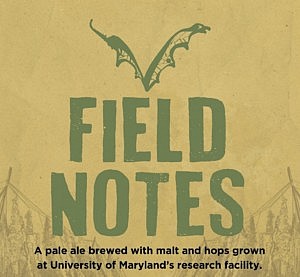Mar
6
Notes from the Field
This past summer, we inked a partnership with the University of Maryland to work hand-in-hand on the future of beer-centric agriculture. To start, the focus is on hops.
Knowing that hops grown locally need to meet the same quality standards achieved in traditional hop-growing regions — like the Pacific Northwest, Germany and New Zealand — UMD’s College of Agriculture and Natural Resources is studying 24 varieties over the next three to five years in Maryland’s unique climate. The first year’s crop was harvested in September.
And because there’s no better way to evaluate hops than putting them in a beer, we did exactly that.
Field Notes Pale Ale will premiere Thursday exclusively in our tasting room. All of the ingredients used were grown at UMD’s Western Maryland Research and Education Center, which is the site of these hop trials. Syngery and Scala malt is alongside Zeus, Glacier, Southern Brewer, Southern Cross and Vojvodina hops.
Out of 24 hop varieties, how did we land on those five?
First off, it was important that the hops be representative of what craft brewers would typically buy, so the hops were harvested and pelletized.
Then, our Brewmaster Ben Clark made “hop teas” with all 24 varieties, steeping the pellets in a base light lager for at least two days to evaluate the aroma they would impart on a beer. We used the same ratio of hops to beer that we would use in a massive dry hop (similar to what we do for The Truth). The five hops we chose for Field Notes had the best aromatics and were also the most agriculturally viable. Here are the profiles observed from each:
- Zeus: Herbal, grassy, dill
- Glacier: Strong resin with mild fruit
- Southern Brewer: Tangerine and resin
- Southern Cross: Sweet tropical fruits
- Vojvodina: Floral followed by melon
While you can get an idea of aromatics from both rubbing just-harvested hops and making hop teas, we won’t know the exact flavor profile of any new hop until we brew with it, which is why experimental projects like Field Notes are so important for our work with UMD. And, it’s only the beginning.
Field Notes is on draft only, but limited-edition Crowlers are available while they last.
Previous Post
← Reform is (Hopefully) on Tap Next Post
Original Source Here

